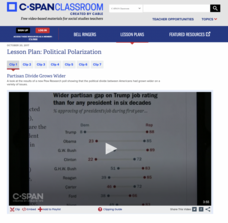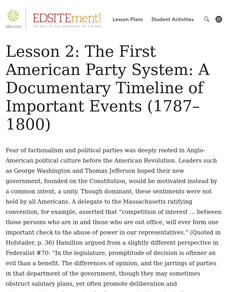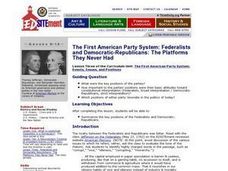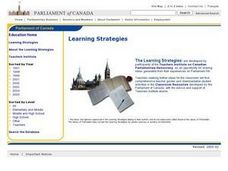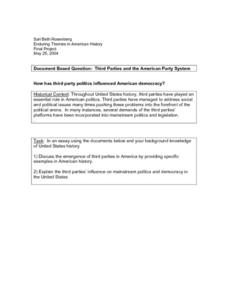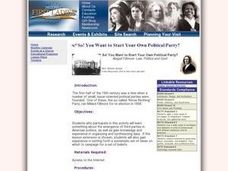Carolina K-12
Political Parties and Conventions
The two major parties polarize many in America today, but it doesn't have to be that way in the classroom! Teach learners about political party platforms and modern campaigns with a mock political convention. After watching a PowerPoint...
Curated OER
In Praise of Political Parties
Students research a political party and prepare a report about its history, philosophy, and the party's position regarding two major political issues. They complete a variety of additional creative activities regarding their party, as well.
C-SPAN
Political Polarization
Dive into the political breach with pupils and explore the reasons for political polarization. Using clips from C-SPAN that include discussions from reporters and scholars, class members consider what is causing the political fault lines...
Curated OER
Political Issues and Opinions
The emergent adults in your US Government class can become informed, self-aware voters. This activity enables them to form an opinion about particular political issues then identify themselves on the political spectrum. Informed and...
Curated OER
American Political Culture
Examine American political culture with your scholars using this self-assessment instructional activity. Individuals rate a list of 14 values from highest to lowest, including ideas such as financial security, right to private property,...
Curated OER
The First American Party System: A Documentary Timeline of Important Events (1787-1800)
Students conduct research on the events of the end of the 18th century in order to identify critical factors leading to the development of the Federalist and Democratic-Republican political parties. They summarize the key positions of...
Curated OER
The First American Party System: Federalists and Democratic-Republicans: The Platforms They Never Had
Students investigate the beginnings of the political party system in the US. They determine the key positions of both the Federalists and the Democratic-Republicans. They compare the views of the early political parties with those of today.
Curated OER
Political Parties, Platforms, and Planks
Ninth graders examine the origins and functions of political parties. In this American Government lesson, 9th graders create a party platform to address political issues that are likely to arise during a national election. Students...
Curated OER
The First American Party System: Events, Issues, and Positions
Students identify factors which lead to the development of the Federalists and Democratic-Republicans. They examine the writings of Thomas Jefferson and Alexander Hamilton as well. They discuss what elements are needed for an orgainized...
Constitutional Rights Foundation
Winner-Take-All: The Two-Party System
Two's company, three's a crowd. High school historians learn about the Electoral College, a two-party, winner-take-all voting system in the United States. The lesson explains the pros and cons of the two-party system, roadblocks for...
Curated OER
The Constitution and Our Republic: Political Parties and the Election Process
Students discuss the role of political parties in the election process. In this election process activity, students work in groups to examine the major functions of political parties and the role political parties play in the election...
Curated OER
Alexander Hamilton and the Roots of Federalism
Explore the origin of political parties in the United States. Learners work in groups to read and analyze copies of the "Report on Manufactures" written by Alexander Hamilton. Then, they complete a worksheet comparing the Federalists to...
Curated OER
The Voting Game
Upper graders play the voting game to help them understand voting patterns, political movements, and build a content specific vocabulary. Each student creats a chart to determine if his or her political view veers liberal or...
University of North Carolina
American Revolution: Events Leading to War
After learning about the growing revolutionary sentiment among colonists, class members work in small groups or pairs to design a political cartoon.
Carolina K-12
Causes of the American Revolution
Beginning with the experience of hearing that lockers in school will be taxed, through analysis of political cartoons and informational text, and culminating in a debate between loyalists and patriots, your class members will engage in a...
Center for History Education
Lincoln and the Republicans: The Cause of the War?
In today's political rhetoric, many forget the pivotal role the Republican Party played in the causes of the Civil War. The party's formation was the final straw for Southerners who saw the enslavement of people of African descent a...
Curated OER
Third Parties and the American Party System
Twelfth graders examine the role of third parties in American politics. Individually, they use primary source documents to write an essay on how third parties emergered and why. They also discuss the influence third parties have on...
Curated OER
Donkeys and Elephants and Voters, Oh My!
Young scholars celebrate party politics. In this American politics lesson, students discover what the 2 main political parties in the country are and discuss their functions. Young scholars then participate in a classroom simulation that...
Curated OER
Online Lesson Political Parties, Platforms, and Planks
Students explore historical political parties and their platforms. After studying the origins and functions of political parties, students create their own platform to address current issues. In groups, students design an ad campaign...
National First Ladies' Library
So! You Want to Start Your Own Political Party?
Learners examine the emergence of third parties in American politics during the first half of the 19th century. Working in groups, they research a Third Party and determine why the party was founded as well as who were instrumental in...
Curated OER
Progression of Political Movements
High schoolers examine the various political parties throughout history. In groups, they are given documents identifying the platforms of the parties in the 1868 election. To end the lesson, they share their information with the class...
National Woman's History Museum
Tea with Penelope: A 2-Point Perspective of the Edenton Tea Party
A brief introduction to Penelope Barker sets the stage for a discussion about political cartoons and the persuasive technique used to create them. A graphic organizer aids scholars in the analysis of a piece of work using a 2-point...
National First Ladies' Library
Politics! Politics! The Emergence of Political Parties in the U.S.
High schoolers are split into six small groups which focus on one of six websites, that tell the story of the emergence of the Federalist and Democratic-Republican parties at the end of the 18th century. They compile a chronological list...
Stanford University
Political Bosses Lesson Plan
Students research the political bosses and the political machine in New York City. In this politics activity, students review the term progressives, political bosses, and political machine. Students study a Tammany cartoon and read...




